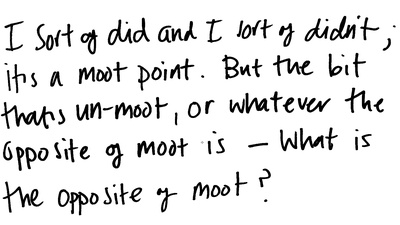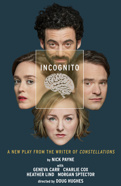Incognito Scribe Nick Payne on Being ‘Mr. Science Playwright' & Why It’s Healthy Not to Be Interested in Theater

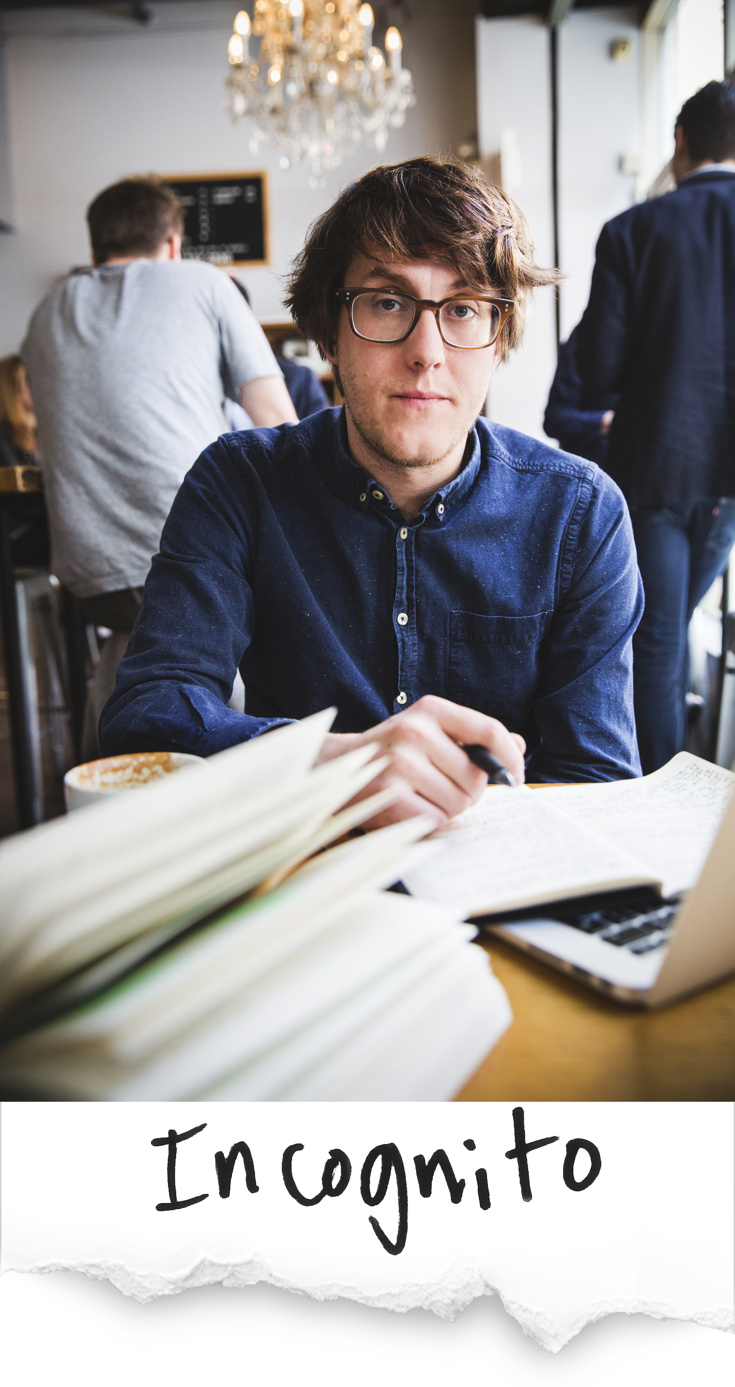
(Photo: Caitlin McNaney)
British playwright Nick Payne made a splash on Broadway in 2015 with Constellations, an entertaining piece about quantum physics that starred Jake Gyllenhaal and Ruth Wilson. The scribe, who is also known for his plays If There Is I Haven’t Found It Yet, One Day When We Were Young, Lay Down Your Cross, The Same Deep Water as Me, Elegy and more, is back at MTC (where Constellations also played) with Incognito. The piece features four actors playing multiple characters grappling with memory, questions about selfhood and mysteries of the brain. Payne met up with Broadway.com at one of his favorite places to write in New York (Midtown’s Culture Espresso) to talk science, structure and what he sticks on his wall.
What's the first thing you do when you're getting ready to write?
I make a coffee. This is really nerdy, but I have an AeroPress; I grind the beans and everything. It takes about 15 minutes and that wakes me up. I like the routine of it. Then I sit down at my desk, and I start straight away.
Do you procrastinate before you get going?
Not when I have something I'm working on. I don't have a smartphone—just an old Nokia, so I try not to look at emails in the morning. I just start. I just write...but then I waste the afternoons.
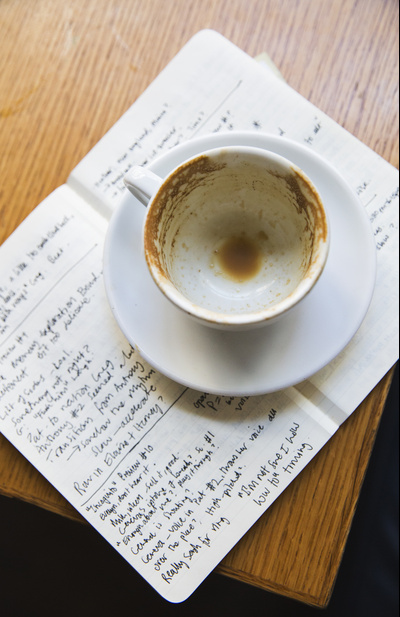
What inspired Incognito?
The honest answer is a bit like the play—a mishmash of things. The way in which I came to the stories was almost random. During Constellations, I read a biography of Einstein; I was trying to understand relativity and that sort of thing. There was either a footnote or reference towards the end about Thomas Harvey, who took [Einstein’s] brain. It stuck with me, so I did a bit more reading about him, and I ended up reading a great book by Suzanne Corkin called Permanent Present Tense [about Patient HM, Henry Molaison]. At the end of the book, she talks about when Henry was in his late 80s and was very ill. They could see that he was going to die and wanted to secure his brain for research. I found a weird link between those two stories and thought maybe they could overlap in some way.
How do you synthesize your research?
I read a lot and then I laboriously type up quotes that I think might be of use to me. Then highlight all the bits I want to remember. I'm not copying from the book because I'm going to literally put that stuff in the play; it's so I have a map of everything. Then I stick that on the wall, so if I'm writing—funnily enough my memory actually isn't that good—I will be able to quickly refer to something and check a date or a place or an idea.
Do you create an outline or jump right in?
I do have a sort of plan, but it’s really just a basic sentence for each scene.
What plays changed your life?
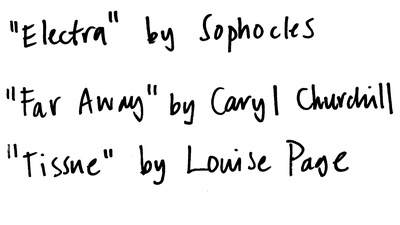
Why do you write in such an unusual structure?
I'm led by the ideas: In Constellations, the idea was everything that can happen does happen and is happening right now. So I thought if I want to deliver that idea as clearly as I can, I'm not sure a linear way could do that. I hoped that was the best way to communicate that amazing idea, which is both brilliant and beautiful but also really horrifying. In this play, likewise, the idea is there is no continuous self, so you have four performers and you don't have a continuum between how and when and who they play. It's never about a game or experiment, I honestly go in thinking it's the best way to try and deliver the material.
You are obviously inspired by science. Where does that come from?
I don't know. I'd be a very bad scientist. I think it’s because I had written a few plays that were naturalistic in their form, and I found something unsatisfying about it. I hadn't quite cracked those plays. And then just by sheer chance, I read a few books on physics—just because I was interested and didn't know anything about it. I came across the multiverse thing and thought I could tell a story in a nonlinear way. I found that really freeing. It's funny; it's less about the science and more that the science freed me from having to worry about doorknobs and bedroom suitcases. You don't need any of that stuff—you just need some people in a room.
Do you think you'll ever write another naturalistic play?
I don't know. I fear I'm starting to get accused of repeating myself or being Mr. Science Playwright, so maybe I should.
Which playwrights inspire you?
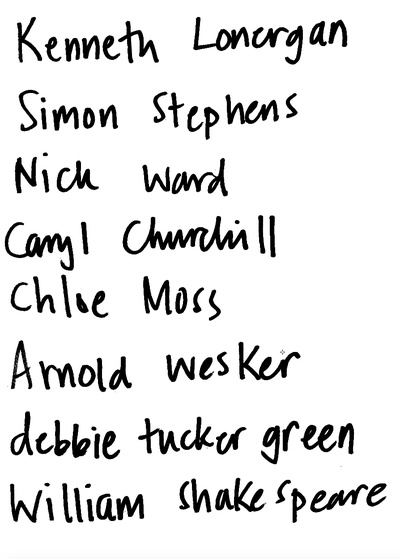
What's the best piece of advice you've ever received about writing?
My agent years ago said, “Get a job that's not writing so you don't have to worry about making money from writing.” You should just try to do the things you want to do because when it comes time for it to be a job, you'll have to do stuff to make money. That's why I worked in bars or the bookshop or ushering. The only other thing that occurs to me is a quote from Ronald Harwood, where he says of writing: "Only stop when it's going well." It's true if I stop when I'm stuck on something or struggling, then I don't want to go back to it and it has a fog of dread about it. Whereas when you stop when it's going really well and leave it for 24 hours you come back to it and you're raring to go. It's quite basic but quite useful.
What's the nitty, gritty hard work of being a playwright no one ever told you?
Well, production meetings. There's a really boring answer. You're suddenly faced with the reality of people have to make this thing that was just in your head. Sometimes if you've written something that's a bit challenging, you have to sit in a room full of people, who are like: "This is going to be hard." And you start to think: "God, what have I done?" There's that.

What's something you think all aspiring playwrights should do or see or know about?
I think not just to be interested in theater is really good; it's healthy. I don't necessarily think seeing plays and reading them is the best way to figure out how to do it. Like actually go and wander around a gallery or go and meet someone who doesn't like theater, who works in a completely different field and find out why they hate it or why they find it boring.
Where did the title come from?
A book by David Eagleman called Incognito. I just stole it. There is almost nothing in the play from that book. Actors are incognito, it’s what they do. In my head, the four people come on, put on sunglasses and can be anyone.
What's your favorite line in Incognito?
